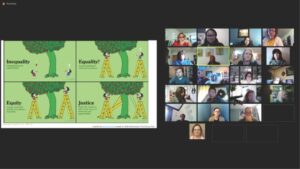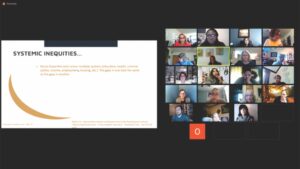From her first days as a family services liaison in Akron Public Schools in 1995, Carla Chapman said equity has always been part of her work.
Now, it is the entirety of her work.
With the school board's recent approval, Chapman has been appointed Akron's first chief diversity officer.
She's moving up from her job as director of community relations, diversity, equity and inclusion to take on the role created by the school board's racial equity policy.
In the new role, Chapman will be tasked with overseeing the execution of that policy, in tandem with the board's strategic plan, Advance APS, and working across departments to conduct equity audits and help overhaul practices as needed.
Here's how she sees the work already underway in the district and her goals for the work still to be done.
Q: How will this role be different than your previous job?
A: I have always been working in this space of removing barriers, addressing community issues, working collaboratively across school community initiatives, but now we have a more focused role that has a lot of work on its own, aside from the family and community engagement pieces.
I think it's different in that our district is focused on equity as a strategic item, and it is our desire that equity be kind of that common thread that runs through all departments. So this role allows for the opportunity to work with others in the district, specifically around the equity strategies and initiatives that they are putting in place within their respective divisions. It gives it more focus. It's different in that laser focus on how equity shows up in all of our work.
Q: What's changed in the district around attention and awareness of issues of equity and diversity?
A: I think it my years with the district I've noticed that we are more data-driven than ever before. And using data in ways that inform work. And so being responsive in that way, to what our data tells us, is part of this work. And really opening ourselves up to examining our practice in ways that uncover blind spots and pays attention to what we might be missing, or what might be new information, new knowledge we can use. I think that is what I've witnessed as real change happening in our district. And it does require that willingness to be open to exploring and understanding new information, embracing differences, being inclusive in our mindset, accepting the ideas and work of others. And really taking on the responsibility for our personal actions, but also our collective work to address equity.
Q: Will you be involved in other areas of the district now?
A: I think we have been collaborative in our district all along and I've worked with all senior staff before on many things. I think what is different now is that we are looking at our data with new eyes and a new lens, with new questions. So that’s what’s different.
Q: Are there areas where you know right now, 'we need to improve on this'?
A: We are right now doing the work necessary to begin the process of looking at curriculum content. I can say for sure that we have hired a new DEI learning specialist in our district that's going to lead some of that work around culturally relevant curriculum content and training and development of our staff.
Right now our human resources office is involved, along with business affairs and our community relations operation side, in looking at how we conduct an equity audit within those departments. So that's happening right now. The development and creation of employee resource groups is underway, to look at how inclusive we are with our staff.
And then the whole idea of supplier diversity and looking at our vendor contracts and how we participate with businesses owned by people of color and females is important as well. All of that is underway, happening right now, even before I was appointed to this position. But now I get to work more deeply with folks through this equity lens.
Q: Do you have specific goals set, aside from what’s in the racial equity policy and Advance APS?
A: We're setting our goals right now. We’re establishing those metrics that we'll be using to guide our work. But ultimately we want to develop a system, a district, a culture that values inclusive and equitable leadership. And we want to graduate students who have that level of critical consciousness about the communities where they’re going to live and work, so that they can make valuable contributions to solving problems around equity in their own lives, their own neighborhoods, their communities, their workplaces. So that's the ultimate goal.
Q: What is the biggest challenge to achieving equity in APS right now?
A: Addressing equity is all about how we address the systemic changes that need to happen. So when we talk about systemic in equity, we're talking about the way a system functions. So those type of changes don’t happen overnight. And systemic issues require systemic solutions. So I guess that would be the biggest challenge, is how do we make the kinds of challenges that truly address those systemic barriers. Because some of them are long-held practices. Things that we may have been doing forever, for long periods of time, that are difficult to change but can be changed. Because we know that's what's required.
Contact education reporter Jennifer Pignolet at jpignolet@thebeaconjournal.com, at 330-996-3216 or on Twitter @JenPignolet.


